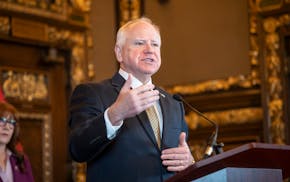Employees at Surly Brewing Co.'s beer hall and pizzeria have decided to unionize in a response to pay issues and safety concerns.
The popular Minneapolis brew hall has been busy in recent weeks, but organizers said many employees are working without health benefits and have seen their pay decrease even as the company has added a 15% service charge management said was meant to help workers.
On Monday afternoon, members of Surly's hospitality and kitchen staff members told management of their intent to unionize as part of Unite Here Local 17, which represents more than 6,000 workers in hotels, restaurants and other hospitality establishments in Minnesota.
"In a time of uncertainty, our demands include open conversations and mutual transparency," according to a statement from the organized group Unite Surly Workers. "As dedicated employees, we deserve a say in changes that affect our compensation, health insurance and employment. … Since its inception, Surly has been a leader in the beer industry. Today, we are asking them to pioneer the fight for workers' rights."
A spokeswoman for Surly's responded: "Today, some of Surly's hospitality employees notified management of their intent to unionize. We're working on determining next steps."
The contract would cover up to 110 workers; beer production employees would not be eligible.
After the beer hall reopened in June, Surly stopped taking cash payments, and the tip line was removed from card bills. While hourly wage for front-of-house workers has been increased, Megan Caswell, who pours beer for customers at Surly, estimates her wages have fallen 40% without tips.
On top of that, Caswell doesn't have health benefits, and isn't clear when or if she will ever receive them.
"We're kind of all running around doing the best we can but … it's pretty disorganized," said Caswell, who has worked for Surly for about five years.
Back-of-house workers such as dishwashers were given even less of a pay bump, usually around less than $1 per hour, workers said.
Andy Magill, a full-time pizza cook at Surly, said he was happy to be asked back to work. The Surly staff, as at most other restaurants, was furloughed in March when eating establishments had to close their dining rooms because of mandated restrictions aimed at stemming the spread of COVID-19.
But he and other workers were concerned with their safety when the brewery went to a counter-service model where people would form long, crowded lines to gather their orders.
Despite complaints from employees, the counter model continued until late July when Surly had to close for about a week after an employee tested positive for COVID-19. Around the same time, Minneapolis Mayor Jacob Frey ordered bars, restaurants, nightclubs and more to close their bar areas to counter service to limit the spread of the disease.
In a public statement at the time, Surly management said: "We're going to take this time to add further safety steps and tweak our service model again so we're compliant with the new Minneapolis Emergency Regulation on bar areas. When you come back to the beer hall, it'll be another new experience."
However, Magill said the busy brewery is still too lax with customers, allowing them to eat in large groups and push tables together.
"It's clear that they are trying to care more about customers than staff," he said.
Jason Olson, who works full time behind the bar, said some workers were told that they would be receiving health benefits in September, but it now sounds like the changes won't come until later in the year.
"It's a world pandemic. … I'm around hundreds and hundreds of strangers a day," Olson said. "It seems risky to me that I don't have any doctor benefits."
This wouldn't be the first time Surly employees have been vocal about their working conditions.
In 2018, Surly settled a $2.5 million class-action lawsuit launched by employees that accused management of violating state law by allegedly making tip-pooling mandatory. At the time, the plaintiffs' attorney said the case was the largest tip-pooling settlement in the history of the state. After attorneys' fees and expenses, eligible staffers received about $12,000 each.
Nicole Norfleet • 612-673-4495
Twitter: @stribnorfleet

Delta hiked fares for solo travelers, until Twin Cities travel experts caught the change

In first speech back, UnitedHealth's new CEO pledges to review hot-button issues

A child had measles at Mall of America, concerning state health officials who don't know source

Ramstad: Gov. Walz, things are not getting done in Minnesota

